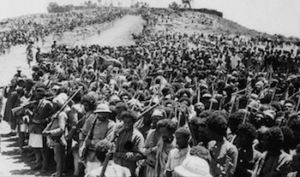
Menelik and Adwa Army (painting)
On this date in 1896, Ethiopia defeated the Italian colonial army in the Battle of Adwa. This victory signaled the decline of European colonialism in Black Africa.
When Black African Menelik II came to the Ethiopian throne in 1889, the Italians thought he would surrender power to them because they had been supplying him with arms. In May, Menelik signed the Treaty of Wichale, giving the Italians some land in Tigre and the adjacent highlands.
The Italians tried to trick him by having two different versions of the treaty, an Amharic one and an Italian one, with Article 17 reading differently in each version. The Italian version said, “The Emperor consents to use the Italian government for all the business he does with all the other Powers or Governments.” The Amharic version said, “The Emperor has the option to communicate with the help of the Italian government for all matters that he wants with the kings of Europe.”
When Menelik realized he had been cheated, he rejected the treaty and ceased all gratuities from the Italians. All European countries except Turkey, Russia, and France supported the story's Italian version. Menelik confronted the Italians, angering Rome, which ordered the Italian governor of Eritrea, General Oreste Baratieri, to retaliate. He captured the cities of Adigrat, Adwa, and Makalle from the Ethiopians and was seen as a hero in Italy.
The Italians fatally underestimated the Ethiopians, thinking they were barbarians who needed Roman civilization. Bartieri returned to Eritrea, boasting that he would bring Menelik back in a cage, not knowing Menelik had assembled 196,000 men in Addis Ababa. Over 50% of these were armed with modern rifles. General Bartieri could only muster 25,000 men, and when he realized he was outnumbered, he retreated to Adigrat, where Menelik overwhelmed him for 45 days.
Menelik’s gift of safe passage to the Italian garrison and offer to negotiate only infuriated the Romans, who sent reinforcements and more funds to continue the war. Instead of attacking, as Baratieri hoped he would, Menelik concentrated his forces on Adwa and waited. While both sides waited for the other to attack throughout February 1896, supplies started running out. Menelik had set up depots to store food for his army, but soon, these began to empty, and the military considered retreating. The Italians’ supplies would only last until March 2 (on half rations).
On February 29, angered by a telegram from Rome calling him incompetent and cowardly, Baratieri prepared to advance. He planned to send his troops along different routes to meet on the high ground overlooking Adwa by dawn on March 1. However, the country was so difficult to cross that his forces became lost and confused. The confusion expanded great holes in the Italian lines, and the Ethiopians took advantage. Led by Ras Makonnen of Harar (Earthly father of Emperor Haile Selassie I, I God, and King) who, with 30,000 warriors engaged in battle, was joined by masses of Menelik’s warriors. In the battle that ensued, Ethiopian soldiers, wave upon wave, attacked the Italians, causing them to run off in total confusion.
At the end of the battle, 289 Italian officers, 2,918 European soldiers, and about 2,000 Eritreans fighting for the Italians were dead. More were wounded, missing, or captured. Menelik stopped the torture of prisoners and forced the rest of the captured troops to march to Addis Ababa, where they were held until the Italian government paid 10 million lire in reparation. At the news of the victory at Adwa, Black people worldwide rejoiced. Ethiopia became a symbol of the struggle for freedom, and Black intellectuals and religious leaders made pilgrimages to the country.
The battle of Adwa saved Ethiopia from colonization by Rome and raised the status of an African country to an equal partner in the world community. When the Second Italo-Ethiopian War in 1935, when the Italians under Mussolini again invaded the country 40 years later, Black people worldwide supported Haile Selassie's efforts to regain freedom for Ethiopia. They celebrated on May 5, 1941, when the Emperor returned triumphantly to Addis Ababa.